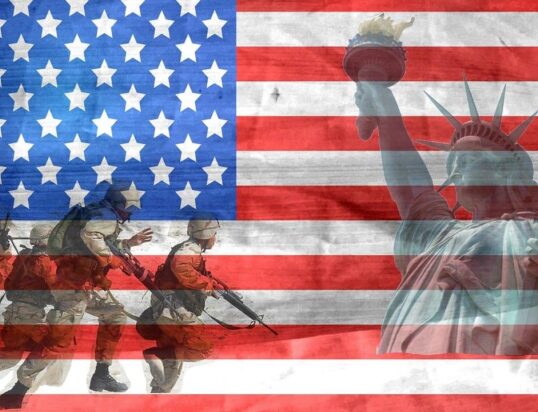“Thank you for your service.” The woman’s voice draws my attention and I watch the TV. She is shaking the hand of a veteran arriving home after an Honor Flight. The news clip ex-plains that the Korean War veteran had spent the day with his daughter viewing memorials in Washington DC, visiting with other veterans, and now is arriving home. The camera focuses on the elderly man’s face as he sees one final surprise to this day. The Mosinee airport hallways are lined on both sides with people waving flags or holding banners. A band plays “Stars and Stripes Forever.” People dressed in red, white, and blue hold out their hands. Tears pooling in his eyes, the veteran shakes every outstretched hand.
Maybe you, too, have been moved while watching these clips and considered volunteer-ing. Wanting more information, I met with veteran volunteer extraordinaire, Betsy Grant, who discussed the need for volunteers to help make events such as the Honor Flight possible. People are needed to decorate, entertain, provide snacks and to line the airport hallways. To quote Will Rogers, “We can’t all be heroes. Some of us have to stand on the curb and clap as they walk by.”
Betsy, who was honored by the Wisconsin DAR for her volunteer service, cherishes her experiences with the Honor Flight and encourages those interested to find information at www.honorflight.org.
Betsy had additional ideas for how we can support those people who have served.
• Attend a Veteran’s Day program.
• Serve meals to veterans at VFW events.
• Donate to organizations such as the American Legion Auxiliary during their annual poppy sale.
• Join the VFW or American Legion or auxiliary (qualifications may apply) where you’ll be able to identify the greatest needs and work to meet them.
• Visit veterans or members of the auxiliary in nursing homes and hospitals.
• When seeing someone in uniform, thank them for their service.
I also spoke to WWII Fireman First Class veteran Duane Wilcox and his wife Joan, a re-tired teacher. Duane and Joan were able to attend the WWII Memorial dedication ceremony in Washington D.C. in 2004. They viewed many of the sites including Arlington Cemetery.
Duane shared his method of letting his parents know his location during his deployment in the South Pacific. He showed me a map where he’d labeled places such as the Philippines and Okinawa with various letters of the alphabet. His parents had an identical copy. If he wished to let them know where he was (he sometimes withheld this information so they wouldn’t worry) he would address a letter home and give his father the middle initial of the coded area. For exam-ple, if he was in the Philippines, labeled “A,” his father would have the middle initial of A.
The need for a scared and lonely young man to reach out to his parents helps remind me of all the sacrifices veterans have given and are still giving today. Veterans might suffer from the long-term effects of exposure to harmful chemicals such as Agent Orange. They might deal with post traumatic stress disorder, making it difficult to keep a job or friends.
Duane spoke of the importance of helping veterans who are homeless or lonely. We can’t all provide financial help, but we can all reach out to a veteran who might appreciate a visit or a shared meal.
When I asked Duane’s wife, Joan, what message she felt was important to communicate with readers in a Veteran’s Day column, she talked about the need for schools to prioritize edu-cating students in history and civics, and for parents to model good citizenship.
For any Veterans reading this column, I hope you know we appreciate you, we wish you the best, and we thank you for your service.

